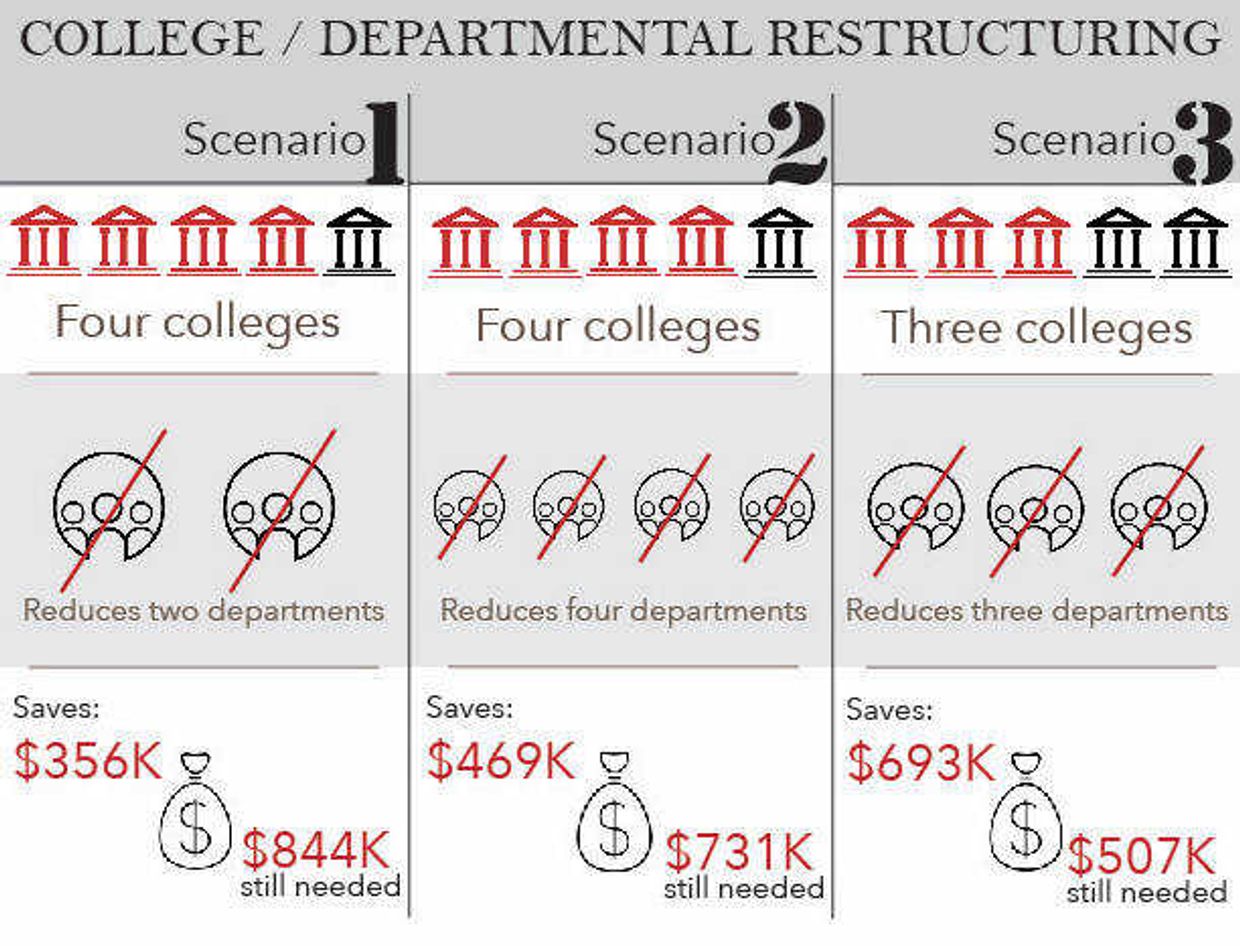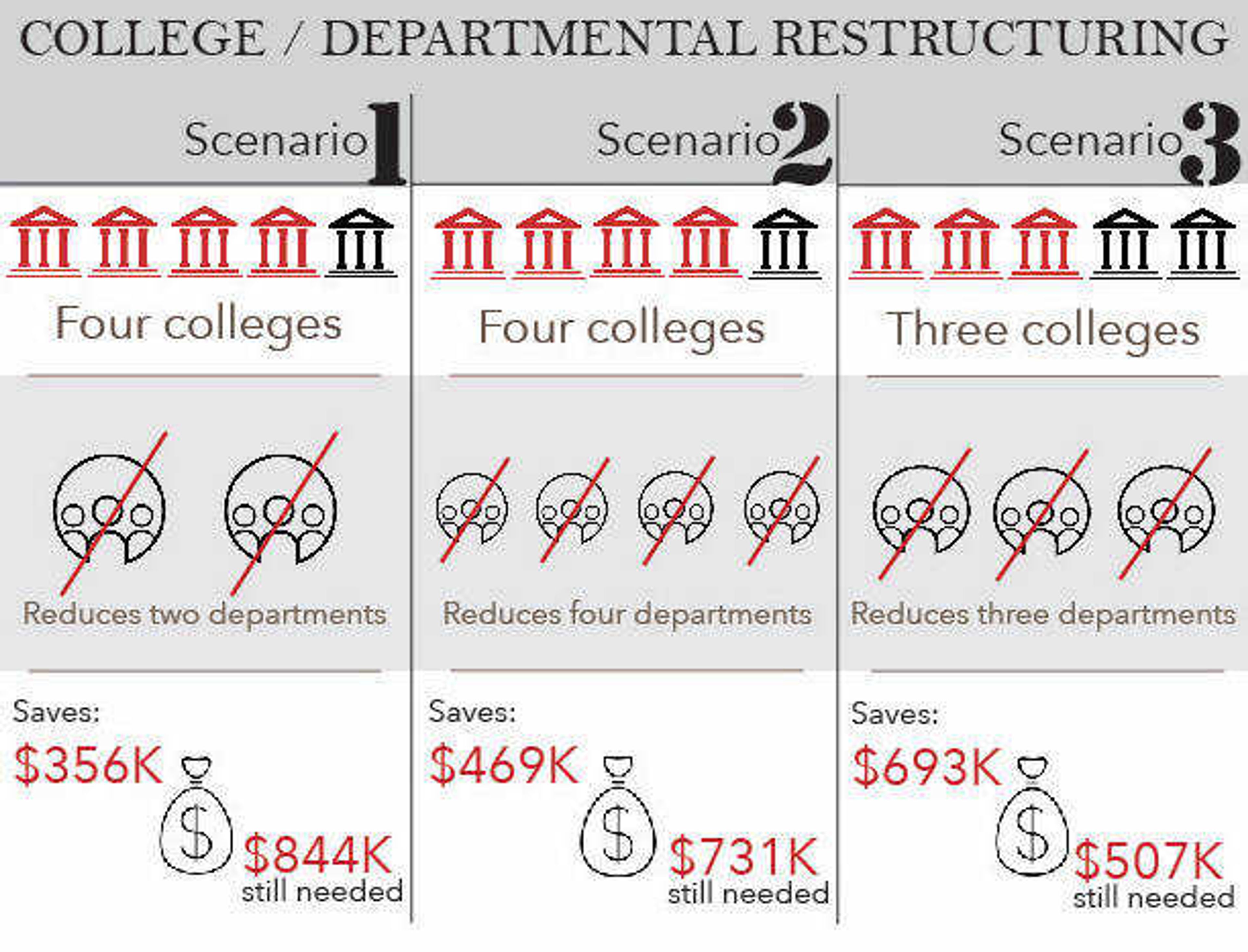With rising expenses and declining enrollment, Southeast simply cannot go on with the five colleges that exist within the university now, according to the chief academic officer, Provost Karl Kunkel.
At a common hour presentation to faculty and staff at Academic Hall Oct. 25 Kunkel proposed three possible scenarios for restructure that would eliminate at least one college and multiple departments.

The academic affairs sector of the university hopes to approve a restructuring proposal by May 18 to be implemented by July 1 for FY18, becoming operational for the 2018 fall semester, according to Kunkel.
The academic affairs sector of the university needs to identify $1.2 million in department cost reductions — a fraction of the $6.1 million gap in the university budget.
Kunkel said the proposed scenarios came from the university’s Council of Deans along with the executive staff.
The three possible scenarios ranged wide in capital efficiencies and amount of change within the colleges and departments. The first scenario, which Kunkel called minimalistic, would merge the College of Education with the College of Health and Human Services. This scenario would save an estimated $350,000.
The second scenario would reduce one college and four departments and make the Holland school of Visual and Performing Arts an autonomous entity.
“As an autonomous school, the River Campus would be elevated beyond the structure of another college,” Kunkel said. “It adds to its prestige, its profile and its attraction.”
This plan would again combine the College of Education and College of Health and Human Services, as well as moving the Department of Mass Media to the Harrison College of Business. It would also include a College of Science and Humanities that combines the departments of biology, political science, English, mathematics and more. This plan would save an estimated $469,000.
Kunkel said the third scenario was a bit radical and the most significant of the three. It would create a College of Art and Sciences with three different schools: School of Liberal Arts and Humanities, School of Technology and Agriculture, and Holland School of Visual and Performing Arts. This plan would again combine the College of Education with the College of Health and Human Services, and place the mass media department under the Harrison College of Business. Reducing two colleges and three departments, the plan would save the university an estimated $693,000.
Kunkel encouraged the some 150 faculty and staff members in attendance to ask questions and give feedback on the suggested scenarios. He said the final reorganizations should be a combination of the three scenarios rather than one option over the others.
Mass media department chair Pam Parry asked about the rationale behind moving the Department of Mass Media to the Harrison College of Business. Kunkel said the business aspect of mass media degrees make it a viable transition.
He said academic affairs want to propose mergers that “make sense,” ensuring faculty and staff that academic affairs would protect the academic core of the university, as well as faculty positions and the handbook process for restructuring.
“It all depends on where we want to find the money for reductions,” Kunkel said. “I’m looking forward to the reactions to these ideas.”
FY18 will represent the first in a three-year plan to get the budget back on track. Kunkel said the first year will combine “one-time money” with the reduction of chair positions and other cost deductions.
One staff member asked the provost about compensation for workloads that would likely be doubled or tripled by the reorganizations. Kunkel did not indicate any specific compensation but did note that promotional salary raises will still be funded.
Kunkel said for students, the only visible result of the restructuring would be the chair to whom they report.
University executives and the Budget Review Committee will continue working toward a balanced budget, Kunkel said, but with cuts in federal and state funding, increased health insurance premiums and declines in enrollment, the budgetary issues will likely be recurring.
“When we do these reductions we should be able to come up with a balanced budget,” he said. “Assuming we don't get hit again with other cuts or enrollment decline — anything that affects the budget, for right now this is a path of solvency.”
View Provost Kunkel’s presentation here: http://www.semo.edu/pdf/Provost-AcademicAffairsReorganizationForum2017.pdf.





